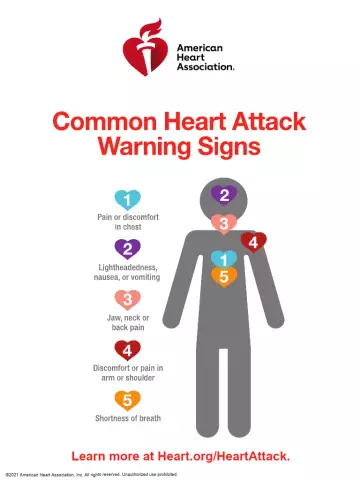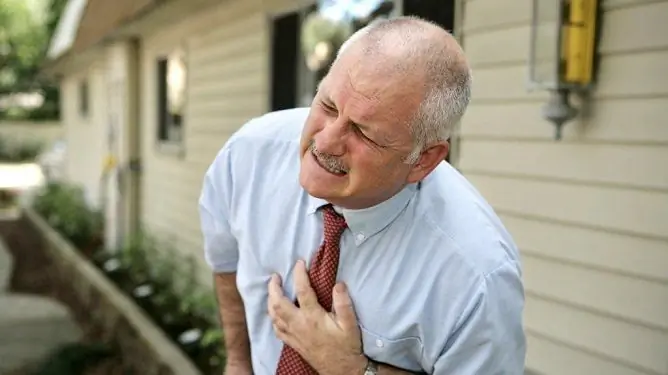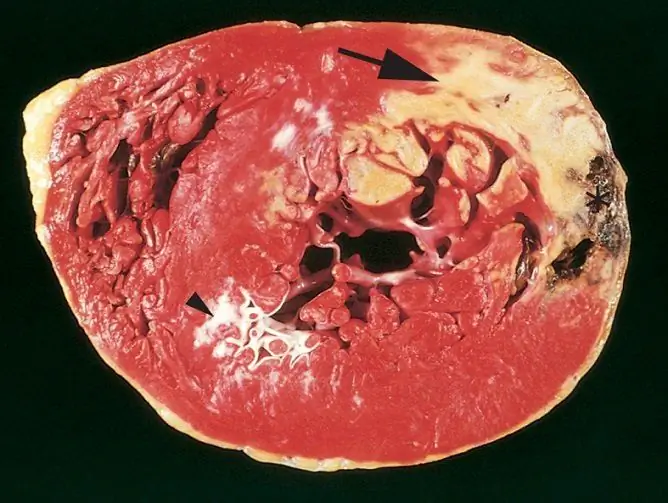- Author Rachel Wainwright wainwright@abchealthonline.com.
- Public 2023-12-15 07:39.
- Last modified 2025-11-02 20:14.
Heart rheumatism
Brief description of the disease

Heart problems are a hallmark of modern society, which is characterized by: a sedentary lifestyle, addiction to bad habits, promiscuous sexual intercourse and poor nutrition. In addition, chest bruises, hereditary factors, syphilis, vascular sclerosis and some other diseases can be the causes of heart defects. If we talk about the most common problems of the cardiovascular system, then, first of all, it is worth highlighting rheumatism of the heart, the treatment of which is increasingly required by young people.
Heart rheumatism is an inflammatory process that accompanies rheumatism. In this case, disorganization of the connective tissues, the formation of rheumatic nodules, their subsequent scarring and the development of cardiosclerosis occur. Note that inflammation does not have a clear localization, and in some cases it captures all the membranes of the organ. However, modern medicine, with its effective diagnostic technologies, rarely brings such a sad outcome. As a rule, the disease can be detected in time, when it is concentrated in any one department. If, when diagnosed with rheumatism of the heart, the symptoms indicate damage to the muscles of the organ, then doctors talk about the myocardium. The impact on the inner lining is called the endocardium. Well, if the inflammatory process affects the outer shell, then this defect is called the pericardium.
Heart rheumatism - symptoms and clinical picture
When examined in a specialized clinic, patients are revealed: expansion of the boundaries of the heart, changes in blood composition, the appearance of noise in the work of the organ and the muffledness of its tones. It is possible that symptoms of heart failure appear. In addition, the hallmarks of rheumatism of the heart are:
- chest pain;
- increased body temperature;
- nosebleeds;
- uneven cardiac activity;
- general weakness;
- frequent shortness of breath;
- pallor of the skin;
- sweating;
- fast fatigue even with the smallest physical exertion.
Depending on the severity of the inflammatory process, doctors distinguish focal and inflammatory rheumatism of the heart. The first is characterized by mild manifestations of heart failure and an increase in organ size in the absence of adequate treatment. Valves are at particular risk as they are most susceptible to inflammatory reactions. If diffuse rheumatism of the heart is diagnosed, the symptoms of the disease are more pronounced and are characterized by greater manifestations of heart failure, which affects the choice of treatment method.
Heart rheumatism - treatment of the disease

The main goal of medical procedures is to reduce the severity of the inflammatory process, eliminate manifestations of heart failure and return the cardiovascular system to its normal functionality. If the patient has an exacerbated rheumatism of the heart, he is shown strict bed rest. For this reason, patients are usually hospitalized in a specialized department of the hospital, because in a hospital setting it is much easier to monitor a person's condition and take urgent measures in case of exacerbations of the inflammatory process.
The heart rheumatism therapy is based on complex treatment with the obligatory use of antibiotics and anti-inflammatory drugs. Patients are prescribed penicillin, erythromycin, glucocorticosteroids. With advanced and complex forms of rheumatism of the heart, treatment is based on taking gamma globulin drugs and desensitizing drugs. Additionally, throughout the course of anti-inflammatory therapy, the patient takes vitamin preparations, including ascorbic acid.
The optimal dose of glucocorticoids is chosen taking into account the severity of the pathology and the severity of the changes that have occurred. As a rule, patients take prednisone in the amount of 15-25 mg / day, and the bulk of the drug should be in the morning. If the patient is diagnosed with prolonged rheumatism of the heart, treatment is based on the intake of non-steroidal anti-inflammatory drugs, which are combined with glucocorticoids and basic drugs (chloroquine, plaquenil, benzylpenicillin).
Spa treatment plays an important role in getting rid of rheumatism of the heart. Fresh air, mineral waters, mud therapy, measured, calm lifestyle have a huge effect and contribute to the rapid recovery of people even after the most protracted and difficult treatment, as well as multi-zone air conditioning systems.
YouTube video related to the article:
The information is generalized and provided for informational purposes only. At the first sign of illness, see your doctor. Self-medication is hazardous to health!






